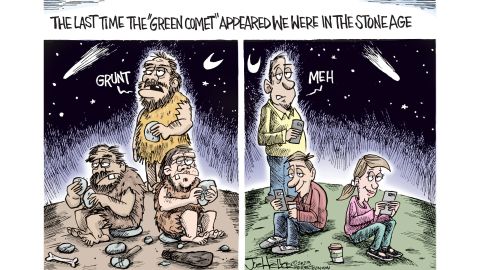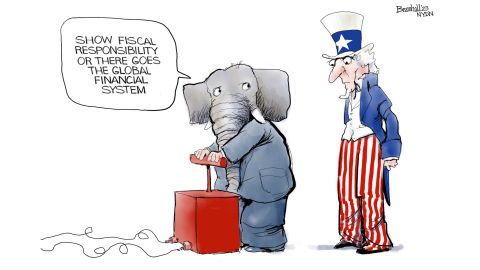Editor’s Note: Sign up to get this weekly column as a newsletter. We’re looking back at the strongest, smartest opinion takes of the week from CNN and other outlets.
CNN
—
In Lord Byron’s satirical epic poem, “Don Juan,” the main character marvels at “the whole earth, of man the wonderful, and of the stars … of air-balloons, and of the many bars to perfect knowledge of the boundless skies — and then he thought of Donna Julia’s eyes.”
The balloon from China floating eastward over the United States last week riveted the nation’s attention for a lot longer.
At first, the enormous balloon, carrying a smaller substructure roughly the length of three city buses, seemed to symbolize America’s wide-open vulnerability to what the Pentagon described as surveillance from a rising power.
But the downing of the balloon off the Carolinas Saturday gave President Joe Biden’s administration a way to unleash its fighter jets without any loss of life.
“I told them to shoot it down,” said Biden, peering at reporters through his Ray-Ban aviators at a Maryland airport. Referring to his national security team, Biden added, “They said to me let’s wait till the safest place to do it.”
The incident led to the abrupt postponement of Secretary of State Antony Blinken’s trip to China and an apologetic statement from Beijing calling it a “civilian airship” that had “deviated far from its planned course.” The US Navy and Coast Guard are taking part in an effort to recover the aircraft. which may yield evidence of its true purpose.
Some Republicans criticized the President for not shooting it down sooner. China called the downing of the balloon an “obvious overreaction” and said it “reserves the right” to act on “similar situations.”
In May 1937, the golden age of transcontinental passenger airships came to a catastrophic end in roughly 30 seconds after a spark set the hydrogen fuel on the Hindenburg ablaze, killing 36. But balloons for other uses survived, and they remain a tool of surveillance, even in the era of spy satellites.
“The question is whether China carefully considered the consequences of its actions,” wrote David A. Andelman. “Intentional or otherwise, if it was indeed monitoring air flows, their engineers might have suspected these weather phenomena would eventually take these balloons over the United States.”
He pointed out that China has an enormous fleet of satellites which can surveil other nations. “Between 2019 and 2021, China doubled the number of its satellites in orbit from 250 to 499.”
In the Washington Post, Sebastian Mallaby observed, “To understand how a balloon — at once menacing and farcically Zeppelin-retro — might become a defining image of the new cold war, consider how this alleged Chinese spy contraption captures both sides of the present moment. It is provocative enough to cause Secretary of State Antony Blinken to postpone a much-anticipated trip to Beijing. It is clumsy enough to symbolize China’s immense capacity to blunder — a tendency that President Biden’s team has lately exploited, to devastating effect.”


“It is not hard to tidy up perfectly and completely in one fell swoop,” Marie Kondo wrote in the 2011 book that sold more than 13 million copies worldwide and launched her career as a Netflix star and curator of “joy.”
“In fact, anyone can do it.”
It was an apt sentiment at a time when striving for perfection at home and at work was the norm, despite it being a sometimes soul-crushing aspiration — and one that began to vanish with the arrival of the pandemic in 2020.
So it was understandable that people took notice when Kondo, who gave birth to her third child in 2021, recently said, “My home is messy, but the way I am spending my time is the right way for me at this time at this stage of my life.”
As Holly Thomas wrote, “Her benign comment, while welcomed with relief in some circles, prompted a surprisingly febrile reaction in others. … Kondo’s success was built on tidying, and encouraging us to tidy in turn. Where was her loyalty to tidying? How dare she pivot out of her well-ordered lane after selling us a way to live?”
But that’s the wrong way to look at it, Thomas added. “The discomfort … with Kondo’s personal rebrand demonstrates a rigidity that’s reflected across many areas of life. … On a more sinister level, there can be an implicit sense that once you’ve established a particular trait or activity as inherent to your identity, it is somehow greedy or unfaithful to try your hand at something new.”
Jura Koncius wrote in the Washington Post, “Kondo, 38, has caught up with the rest of us, trying to corral the doom piles on our kitchen counters while on hold with the plumber and trying not to burn dinner. The multitasker seems somewhat humbled by her growing family and her business success, maybe realizing that you can find peace in some matcha even if you drink it in a favorite cracked mug rather than a porcelain cup.”
The new Kondo might welcome a bill in Maryland that would provide tax breaks to companies that switch to four-day work weeks as a pilot project. “We are three years into a pandemic that upended work life (and life-life) as many of us knew it,” wrote Jill Filipovic. “We are living in an era in which out-of-work demands, most especially parenting and other forms of caregiving, are more extreme than ever. And we are living in a country that, unlike other nations, provides meager support as its people strive to balance it all…”
“No wonder so many workers report being fed up and burned out. No wonder so many women, who continue to do the lion’s share of the nation’s parenting, drop out of the workforce.”

The 2024 presidential campaign is just starting to come into focus. Former President Donald Trump has locked on to Florida Gov. Ron DeSantis as the biggest threat to his campaign for the GOP nomination.
Trump “mercilessly slammed DeSantis again … first at a South Carolina campaign rally and then in remarks to the media,” Dean Obeidallah noted. “On his campaign plane, Trump berated DeSantis as ‘very disloyal’ and accused him of ‘trying to rewrite history’ in recent pronouncements about Covid-19 policy in Florida.”
If DeSantis enters the race, Obeidallah observed, “he’ll need to show the red meat-loving GOP base that he can punch back against Trump.”
Yet Trump’s derisive nicknames for DeSantis haven’t stuck, as SE Cupp said. “I know we’re just getting started, but this Trump doesn’t seem to pack the punch that 2016 Trump did. … Maybe he’s lost his touch as he’s faced one political storm after the other.”
Some other potential rivals are queueing up, with Nikki Haley, the former US ambassador to the United Nations, planning to announce her candidacy on February 15 and former Secretary of State Mike Pompeo mulling a possible run.
“Haley is a formidable candidate who brings the executive experience from her days as governor as well as the foreign policy experience from her time as ambassador,” wrote Gavin J. Smith, who worked in both the Trump administration and Haley’s executive office in South Carolina. “This experience, paired with her ability to bring people together, her background as a mom and a military spouse, and her track record of fighting the uphill battle of running against old White men — is exactly why she is the right candidate, at the right moment, for Republicans to rally behind as we look to win back the White House in 2024.”
Mike Pompeo has lost 90 pounds on a diet and exercise regimen. He has a new book out that attacks the media and lambastes some of his Trump administration colleagues. “Based on a close reading of his book,” Peter Bergen wrote, “I bet he will take the plunge. Pompeo could be looking to benefit as Trump loses altitude among some Republicans, and at 59, Pompeo is a spring chicken compared with President Joe Biden and Trump, so if it doesn’t work out well this time around, he sets himself up for other runs down the road.”
When Biden sums up the State of the Union Tuesday evening, the camera will reveal one change from last year, reflecting divided party control of Congress: Republican Speaker Kevin McCarthy — rather than Nancy Pelosi — will be in the backdrop, alongside Vice President Kamala Harris, as Biden speaks from the House podium.
David Axelrod, who served as a strategist and adviser to former President Barack Obama, has some advice for Biden: “Acknowledge the stress people feel, explain how you’ve tried to help but don’t tell them how great things are. Or worse, how great YOU are. You can’t persuade people of what they don’t feel — and will lose them if you try.”
“Rather than claim his place in history, the President should paint the picture of where we’ve been and, even more important, where we’re going…”
Biden met with McCarthy last week, as each staked out their positions on the coming battle over America’s debt limit.
In 2011, Obama and GOP leaders in Congress narrowly averted a default in US debt payments. Republican Lanhee J. Chen pointed out that one of the people “who facilitated the 2011 deal was none other than Joe Biden. Now, many in Washington are trying to predict what might unfold over the next several months as the once-and-future dealmaker approaches yet another debt ceiling crisis — but this time as commander in chief.”
“The current crisis presents an opportunity for moderates in both parties to unite around the need both to raise the debt ceiling but also to put in place lasting changes that will fundamentally improve America’s fiscal trajectory.”

For CNN Politics, Zachary B. Wolf spoke with Robert Hockett, a Cornell University law professor, who argues that the President would have legal grounds to ignore the debt ceiling entirely. Moreover, Hockett disputed the notion that US government debt is on an unsustainable path: “When we measure a national debt, we look at it as a percentage of GDP. It’s much, much lower than the Japanese national debt is, for example, relative to Japanese GDP. And you don’t see anybody worrying about the integrity or the worthiness of the Japanese national debt or whether Japan’s economy can sustain its debt.”
Following Biden’s speech on Tuesday, the new Arkansas governor, Sarah Huckabee Sanders, will give the GOP response. “The 40-year-old certainly provides a contrast to the 76-year-old former President Donald Trump by virtue of her age and gender,” wrote Julian Zelizer.
But the Trump approach is still in the background, he added. “Sanders represents a new generation of Republicans eager to weaponize the same outrage machine with familiar talking points about the threats of immigration, the so-called radical left’s attacks on education, and an economy in shambles under Biden — while showing that they can govern without the self-defeating chaos and tumult that rocked the nation from 2017 to 2021.”
For more on politics:
Elliot Williams: I had a security clearance. It’s easier to lose classified documents than you think
Frida Ghitis: The most important of George Santos’ secrets

The death of a young man after a traffic stop and brutal police beating in Memphis cries out for a response to a national problem, wrote Maya Wiley, CEO of the Leadership Conference on Civil and Human Rights. “Tyre Nichols, who was laid to rest on Wednesday, was killed for driving while Black,” she wrote. “The former Memphis police officers fired for his killing will get an opportunity to defend themselves in court against the criminal charges, as they should. Nichols got no such opportunity…”
“The question we should be asking now is, why are Black people stopped so often for traffic violations? Why are so many across the United States dying at the hands, or tasers or guns of police officers during these stops? And what can be done to change this horrific situation?”
“Here’s one thing we know: Body cameras are not the answer. Body camera footage is not prevention; there was body camera footage of Nichols’ killing. It is evidence, not a prophylactic.”
In the summer of 1966, when the young civil rights leader Stokely Carmichael “climbed onto the back of a truck with generator-powered lights below, he looked as though he had stepped onto a floodlit stage.” Carmichael lamented that after six years of shouting for freedom, “We ain’t got nothing. What we’re going to start saying now is ‘Black Power!’”
Mark Whitaker, who wrote about that moment for CNN Opinion, is the author of a forthcoming book, “Saying It Loud: 1966 – The Year Black Power Challenged the Civil Rights Movement.”
The day after Carmichael spoke, “a short Associated Press story describing the scene was picked up by more than 200 newspapers across America. Overnight, the Black Power Movement was born. … In 1966, the Black Power pioneers established the principle that all Black lives deserve to matter.”
Florida’s governor is engaging in a bad faith attack on the College Board’s “proposed Advanced Placement African American Studies course, citing concerns about six topics of study, including the Movement for Black Lives, Black feminism and reparations,” wrote Leslie Kay Jones, assistant professor in the sociology department at Rutgers University. “Gov. Ron DeSantis said the course violates the so-called Stop WOKE Act, which he signed last year, and the state criticized the inclusion in the course of work by a number of scholars, including me.”
“By villainizing CRT (critical race theory) and then representing African American Studies as synonymous with CRT, the DeSantis administration paved the way to convince the public that the accurate teaching of African American Studies as a field of research was a Trojan horse for teaching students ‘to hate.’ … I must ask where ‘hate’ is being stoked in African American Studies? Is it in the factual teaching that enslaved Black people were considered 3/5ths of a human being?”

Manish Khanduri: ‘Blisters inside my blisters.’ Why we walked the entire length of India
Lev Golinkin: Germany’s quiet betrayal of victims of the Holocaust
Darren Foster: After 15 years of reporting on opioids, I know this to be true
Joyce Davis: How Russia outmaneuvered the US in Africa
AND…

Young adult author Judy Blume is the subject of a new documentary, set to air in April on Amazon Prime. One of her books, “Are You There God? It’s Me, Margaret” is the basis for a new film, also aimed for an April release.
“To say Blume is widely loved would be an understatement, as the documentary shows,” wrote Sara Stewart. “It features interviews with some of the author’s more famous adoring fans, including Molly Ringwald, Samantha Bee and Lena Dunham. It also showcases her correspondence with now-adult women who wrote to Blume, initially, as teenagers — and she wrote back, beginning friendships that would last decades.”
“All of these women speak about the ways Blume’s books changed them, made them feel seen and understood in a way that their parents often did not.” At a time when books touching the topics she covers are increasingly being banned in schools, Blume’s voice rings out.
At 84, she “is still fighting the good fight,” wrote Stewart. At the Key West, Florida, bookstore Blume co-founded, “the shelves bear signs proclaiming, ‘We Sell Banned Books.’”